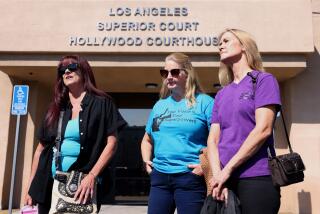After spending 38 years in prison for wrongful murder convictions, man wins $21-million settlement

Simi Valley reached a $21-million settlement with a man who spent more than 38 years wrongfully incarcerated in the brutal 1978 murders of a woman and her 4-year-old son, officials said.
Craig Coley, 71, was released from prison in 2017 after he was pardoned by then-Gov. Jerry Brown, who said that DNA evidence and a painstaking re-investigation of the Simi Valley murders proved his innocence.
The city said Saturday that the agreement would mitigate long, costly and unnecessary legal proceedings. Simi Valley will be on the hook for roughly $4.9 million of the settlement, while the rest is expected to be paid by insurance and other sources, officials said.
“While no amount of money can make up for what happened to Mr. Coley, settling this case is the right thing to do for Mr. Coley and our community,” City Manager Eric Levitt said in a statement. “The monetary cost of going to trial would be astronomical and it would be irresponsible for us to move forward in that direction.”
The state approved a separate, much smaller payout last year. Brown approved a $1.95-million payment for Coley — $140 for each day he was wrongfully behind bars — that marked the largest payout by the state’s Victim Compensation Board for an erroneous conviction.
The victims were discovered by a relative who grew concerned when Rhonda Wicht didn’t show up for a family get-together. The 24-year-old had been strangled with an 11-foot macrame rope, her son, Donald, smothered in his bed.
Coley, a Vietnam War veteran who was going through a breakup with Wicht, was held for questioning that day and ultimately charged with the two murders. He did not have a prior criminal record.
A key witness against Coley was Wicht’s next-door neighbor, who said she heard banging noises and saw Coley’s truck parked outside the apartment complex the morning of the murders. She testified that someone with medium-length hair drove it away.
Another neighbor who lived downstairs told jurors that he heard noises from Wicht’s apartment at 5:30 a.m.
At Coley’s first trial, jurors spent four weeks deliberating before announcing they were deadlocked 10 to 2 in favor of guilt. A second jury convicted him of two counts of first-degree murder in 1980, and he was sentenced to life in prison without the possibility of parole.
But he always maintained his innocence. A retired Simi Valley detective named Mike Bender was instrumental in pushing law enforcement agencies to reexamine the case.
Bender has said that in 2015, he caught the right ear in Brown’s office. A year later, Simi Valley Police Chief David Livingstone also launched an investigation, just as he was taking the helm of the department.
In Coley’s claim for compensation and other court filings, his attorneys and prosecutors detailed troubling inconsistencies in the evidence against him.
The neighbor who heard noises from downstairs first told police, hours after the murders, that he heard the commotion not at 5:30 a.m., but an hour earlier, exactly when Coley, who worked as a night manager at a restaurant, was out socializing with former co-workers. Coley dropped one off at 4:45 a.m.
The new investigation also raised questions about Wicht’s next-door neighbor’s claim that she had seen a man matching Coley’s description drive away the morning of the killings. Exactly 39 years after Wicht’s murder, detectives returned to the neighbor’s apartment to peer out her window.
There was no way, they concluded, that she could have seen from her window whoever was inside a truck parked outside.
But the most indisputable finding that officials said supported Coley’s innocence came when detectives located DNA evidence once thought destroyed.
A piece of Wicht’s bedsheet the night she was found dead contained another man’s sperm, along with a man’s epithelial cells. Coley’s DNA was not found on the sheet.
Investigators also tested stains, blood and semen on a child’s Mickey Mouse T-shirt that police at the time said they discovered in a pile of dirty clothes during a search of Coley’s apartment after the murders. New tests on the shirt revealed the boy’s DNA, as well as the sperm of several individuals. None of them matched Coley.
Soon after Coley was pardoned, a judge declared him factually innocent. Simi Valley police have not arrested anyone else in the killings.
Ron Kaye, an attorney representing Coley, said the settlement offers some closure and vindication for his client, though no amount of money can compensate him for the life he missed while imprisoned.
“He now can live the rest of his life, which we hope will be really well into the future, with the security he deserves,” Kaye said.
alene.tchekmedyian@latimes.com
Twitter: @AleneTchek
More to Read
Sign up for Essential California
The most important California stories and recommendations in your inbox every morning.
You may occasionally receive promotional content from the Los Angeles Times.











